History Is Happening: How One Queens High School Is Bringing Hamilton Into the Classroom
Thomas Edison High School will help kick off the acclaimed musical’s new #EduHam initiative.
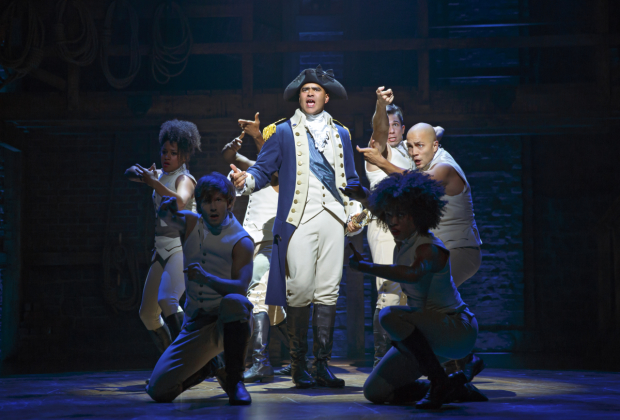
(© Joan Marcus)
Zaviel Young didn't want to miss his baseball game. A pitcher and catcher on Thomas Edison High School's team, this junior was prepared to play in the upcoming April 13 match against Robert Goddard High, while unknowingly giving up a coveted opportunity in the process.
"I was going to miss Hamilton to play in a baseball game," Young says with a laugh.
Young is one of 140 people from Edison, a Title 1 school based in Jamaica, Queens, who will attend this week's Wednesday matinee of Lin-Manuel Miranda's juggernaut Broadway musical at the cost of $10 per ticket. The subsidized ticket price is part of a new education initiative sponsored by the Rockefeller Foundation, the New York City Department of Education, and the Gilder Lehrman Institute of American History.
"Title 1 schools have students that come from low-income houses or the poverty level," said Moses Ojeda, Edison's principal. "It's [determined] based on lunch forms, where you can see what the income is for parents. Based on the number of lunch forms you get that are below that income line, you become a Title 1 school and you get additional funding because they know students that come from that background need extra support."
Edison was chosen by Schools Chancellor Carmen Fariña because of this factor, as well as its status as a career and technical education school aimed at not only preparing students to meet high academic standards, but also for the civic and workforce challenges of the contemporary world. The April 13 performance will welcome 1,300 students with low-income backgrounds from across the city, "representing the different types of schools and school model that exist," Ojeda notes.
The Room Where It Happens
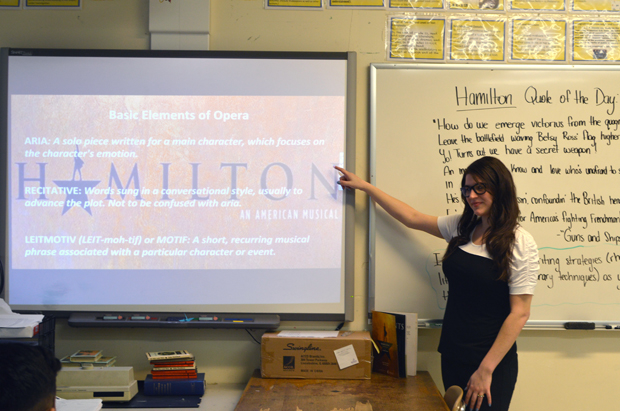
(© Samith Afzal)
But the Hamilton education initiative isn't just a fun field trip. "It's not just about this Wednesday matinee when they come see the show," director Thomas Kail notes. It's the culmination of months of classroom teaching with a curriculum specifically created by Gilder Lehrman.
The program comes with a unique project: like Miranda did while he was writing the show, students must use primary source documents to create their own rap, poem, song, or scene inspired by a Hamilton-adjacent historical event. One student from each school with the best piece will perform it onstage at the Richard Rodgers Theatre.
"We've worked on that in class," says Brett Clark, an English teacher at Edison and a liaison for the Hamilton trip. "The students were given Samuel Seaberry's document [Free Thoughts on the Proceedings of the Continental Congress] and Alexander Hamilton's document [A Full Vindication of the Measures of the Congress] and examined how that was translated into the song "Farmer Refuted" and became something artistic while maintaining historical integrity. Then the students had to create their own."
My Shot
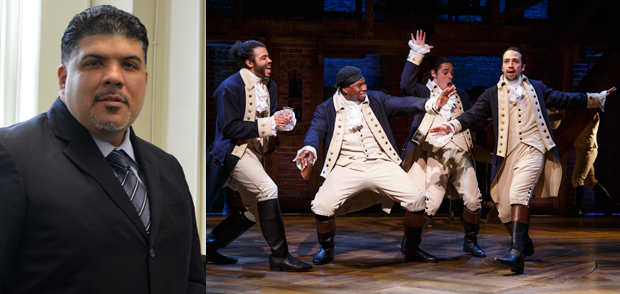
(© Samith Afzal/Joan Marcus)
When the project was first announced and Edison was chosen, many members of the Edison family proved a hard sell. Even Ojeda had to do his homework and research the show ("My kids are into the music now," he says. "It's like this vibe that takes over.") But at first, they couldn't even fill the spots. "We only had ninety kids that wanted to go, out of the one hundred and forty tickets." So he held an assembly. "I played 'Aaron Burr, Sir' and 'Cabinet Battle #1.' I thought those two songs would relate to what they listen to and what they're used to hearing." And sure enough, they ran out of tickets shortly thereafter.
Young was one of these kids who was influenced by the assembly so much so that he was willing to give up his Varsity baseball game for a trip to Hamilton. "I was blown away by how eloquently [it was written]," says Young. "I didn't think a Broadway musical could be that good." His project, a rap about how Thomas Paine came to write Common Sense, was selected for performance at the Rodgers. It was inspired by a curious question. "I thought of Hamilton and the whole message of getting the revolution started, and I figured a big kicker for that was Thomas Paine. I wrote a scene where he's in an office talking to himself, coming up with the idea of Common Sense.
Young isn't a natural performer, but he's "excited to perform it" live. Is he a budding actor or writer in training? "This is new to me," he answers, "but I think I might try and pursue it if I have the right opportunities."
And that's the main goal for Kail and team Hamilton. "The most fulfilling and rewarding element of finding a new audience is finding future theatermakers and future theatergoers," he says. "This show is about finding your voice and expressing your voice, and the reality is, to have a group of young men and women coming there at that age, who are working on a curriculum designed to inspire them, that's where the lasting impact really happens."
Blow Us All Away
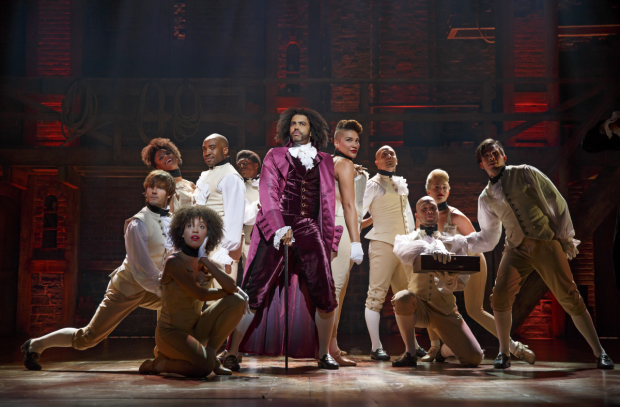
(© Joan Marcus)
Eventually, 20,000 students from across New York City will have gotten to see Hamilton thanks to the Rockefeller Foundation and Gilder Lehrman. The family at the Rodgers, meanwhile, is just as electrified about this event as the students at Edison. "It's as big a thrill as anything you can imagine," Kail says. "The company is so excited about it. We are looking forward to learning from this experience so we can continue and grow the program, and have it exist even beyond New York City."
Ojeda is looking forward to growing the program in his school, as well. "I think that too often nowadays students feel disconnected from what's being taught," he says. "Teaching it with this twist gives them a sense that they can relate to it."
For Clark's part, she's integrating Hamilton into classrooms that aren't eligible for the fieldtrip. "Part three of the [English] Regents is an essay where you have to talk about writing strategies," she notes. "Each day, we have a different Hamilton quote of the day where they have to identify the rhetorical devices. We pulled out twelve in a line from "Burn": 'You and your words flooded my senses/your sentences left me defenseless/you built me palaces out of paragraphs/you built cathedrals.' We had imagery, assonance, consonance, anaphora, and metaphor. It's a way to make Regents prep a lot less boring. And they're liking it."
The principal's ultimate goal is to introduce Hamilton in subjects that aren’t English and social studies. "It's OK to write a rap or hip-hop verse about science or math," Ojeda adds. "If I can get a tune in my head on how to work out a problem or memorize a formula, that stays with me during an exam. That's the connection I see. We have to start thinking outside the box. Kids coming up today are not your regular kids; they've been influenced by technology. Their minds are being developed differently. This is a game-changer and I hope people embrace it like we are."
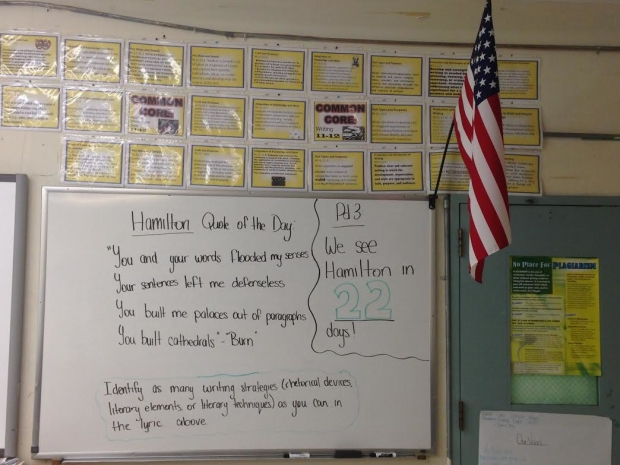
(© Brett Clark)










